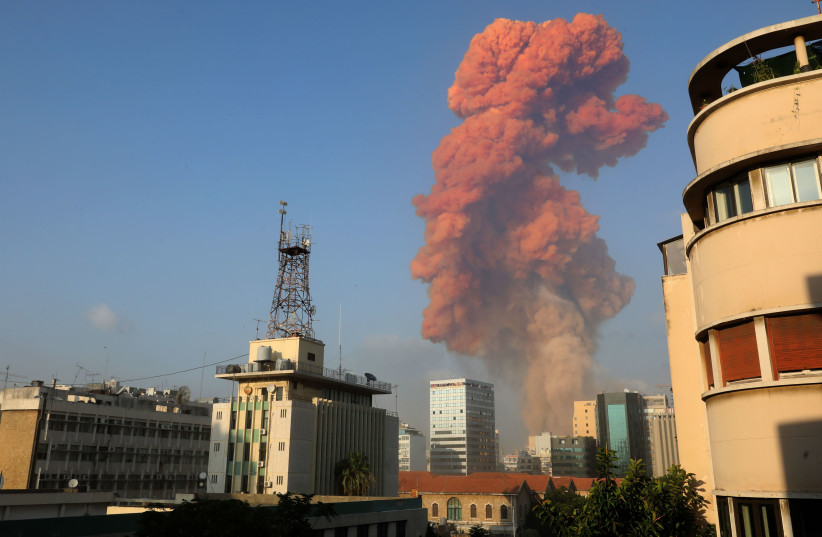“Hezbollah in Lebanon received large deliveries of ammonium nitrate, which are closely related to the material detonated in Beirut.”
By BENJAMIN WEINTHAL
AUGUST 20, 2020 00:23

The scene of an explosion in Beirut on August 4, 2020. The blast, which rattled entire buildings and broke glass, was felt in several parts of the city.
(photo credit: ANWAR AMRO/AFP VIA GETTY IMAGES)
The Lebanese terrorist organization Hezbollah had purchased a large amount of ammonium nitrate that coincided with the storage of the ammonium nitrate that was lodged at the Beirut port and led to a massive explosion in early August, according to a Wednesday report in the German daily broadsheet Die Welt.
The paper wrote that the “Welt has exclusive information from Western secret services. Accordingly, the [Hezbollah] militia bought large quantities of the dangerous substance,” adding that “After the disaster in the port of Beirut, Hezbollah was suspected of having been involved in the storage of the explosive ammonium nitrate.”
Die Welt reported that “according to information from Western secret services that are available to Welt, Hezbollah in Lebanon received large deliveries of ammonium nitrate, which are closely related to the material detonated in Beirut.”
The Welt said it is not certain if the ammonium nitrate at the port was the same ammonum nitrate shipped around the same time to Hezbollah in 2013 and 2014. Hezbollah’s purchasing of ammonium nitrate was shipped through the port and other amounts via airport or overland through Syria.
The Jerusalem Post could not verify the unnamed Western intelligence sources contained in Welt’s story.
The explosion of the ammonium nitrate during the first week of August killed at least 177 people and injured 6,000. The explosive material was believed to have been stored at the port since 2014.
The Welt wrote that Hezbollah had considerable quantities of ammonium nitrate delivered to Lebanon precisely at that time [late 2013 or early 2014]. The Quds unit of the Iranian Revolutionary Guard, i.e. the part of those paramilitaries responsible for foreign operations, which also have a key political position in Iran, is said to have been responsible for the transport.”
Welt said that the deliveries of ammonium nitrate to Hezbollah in 2013 must have occurred on the watch of the head of Iran’s Quds Force, Qasem Soleiman, who was assassinated by the US military in a drone strike in January.
The first delivery is believed to have taken place on July, 16, 2013 and involved 270 tons of ammonium nitrate that was sent from Iran to Lebanon. The invoice was 179.399 euro. On October, 23, 2013, a second delivery of 270 tons of ammonium nitrate was delivered for the cost of 140.693 euro. The amount of the third delivery of ammonium nitrate could not be determined.
A fourth delivery on April, 4, 2014 costed 61,248 euros and Welt estimated that the tonnage ranged from 9o to 130 tons of ammonium nitrate. The total of three deliveries of ammonium nitrate to Hezbollah ranged from 630 to 670 tons.
Welt added that “The freight from October 2013 is said to have been transported in flexible bulk containers by plane, presumably with one of the officially private Iranian airlines, which are considered the front companies of the Revolutionary Guard.”
The paper said one of the airlines,the Iranian-based Mahan Air, “was deprived of the right to take off and landing in Germany last year, with an explicit reference to the activities of the Revolutionary Guard.” The US goverment designated the The Islamic Revolutionary Guard Corps a foreign terrorist organization.
Welt listed a number of Hezbollah and Iranian regime operatives involved in the deliveries of ammonium nitrate to the port. Mohammad Qasir, who who was sanctioned by the US goverment for financing Hezbollah. was listed as a deliverer of the explosive material.
Matthew Levitt, who serves as the director of the Washington Institute’s Reinhard Program on Counterterrorism and Intelligence told the Post that” Qasir heads Lebanese Hezbollah unit 108, responsible for facilitating transfer of weapons and tech from Iran to Lebanon via Syria. Based in Damascus, Qasir and other senior Hezbollah officials work closely with officers from Quds Force’s Unit 190—which specializes in smuggling weapons to Syria, Lebanon, Yemen, and Gaza—under the supervision of the late Qassem Soleimani.”
He said that the” purported effort to procure ammonium nitrate to the 2,750 tons of ammonium-nitrate that blew up earlier this month” are not linked to his account of Qasir’s terrorist activities outlined to the Post.
Levitt, a leading Hezbollah expert, added that “The first link in the weapons transportation chain is Qasir’s Unit 108, which is responsible for moving weapons across Syria to the Lebanese border and then, together with Unit 112, transporting weapons across the border into Lebanon. Another Hezbollah unit, Unit 100, runs a ratline in the reverse direction, from Lebanon to Syria to Iran, ferrying Hezbollah trainees to and from advanced training in the handling and use of the rockets delivered from Iran.
He continued that “Qasir, aka Hajj Fadi, is uniquely qualified to head a unit as sensitive and important as Unit 108. One of Qasir’s brothers, Hassan, is reportedly the son-in-law of Hezbollah Secretary General Hassan Nasrallah. Another brother, Ahmed Qasir, was the suicide bomber who carried out the November 1992 attack on an Israeli military headquarters in Tyre. Nasrallah referred to Ahmed as the ‘prince of martyrs’ at a Martyrs Foundation event marking the anniversary of the attack.”
Content retrieved from: https://www.jpost.com/middle-east/hezbollah-purchased-explosive-material-during-time-of-port-storagereport-639266?fbclid=IwAR06bOUwqznbTRb5qWDQxRN-lKUEp__ddzJSz1ARtKlbjFKot4KWa7Tg6DQ.